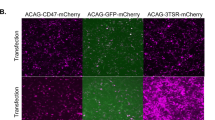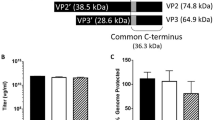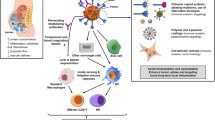Abstract
Adenoviruses (Ads) are efficient gene transfer vehicles, but Ad-mediated gene therapy for ovarian cancer remains limited in vivo by inefficient and nonspecific gene transfer. Mesothelin (MSLN), a cell surface glycoprotein, is overexpressed in ovarian cancer but not in normal tissues except mesothelial cells. Therefore, MSLN is an attractive candidate for transcriptional and transductional targeting in the context of ovarian cancer gene therapy. We evaluated the expression of MSLN mRNA and MSLN surface protein in ovarian cancer cells. Ads containing the MSLN promoter driving reporter gene expression were created and tested in ovarian cancer cell lines and purified ovarian cancer cells isolated from patients. To evaluate transductional targeting, we used an Ad vector containing an Fc-binding domain within the fiber protein, which served as a docking domain for binding with anti-MSLN immunoglobulins. Both RT-PCR and flow cytometry revealed high MSLN gene and protein expression in ovarian cancer cells. The MSLN promoter was activated in ovarian cancer cells, but showed significantly reduced activity in normal control cells. Transductional targeting of Ads via anti-MSLN antibody increased transgene expression in ovarian cancer cells. This report describes the use of MSLN for transcriptional as well as transductional targeting strategies for ovarian cancer gene therapy.
This is a preview of subscription content, access via your institution
Access options
Subscribe to this journal
Receive 12 print issues and online access
$259.00 per year
only $21.58 per issue
Buy this article
- Purchase on Springer Link
- Instant access to full article PDF
Prices may be subject to local taxes which are calculated during checkout




Similar content being viewed by others
References
Jemal A et al. Cancer statistics, 2003. CA Cancer J Clin 2003; 53: 5–26.
Hallenbeck PL et al. A novel tumor-specific replication-restricted adenoviral vector for gene therapy of hepatocellular carcinoma. Hum Gene Ther 1999; 10: 1721–1733.
Chang K, Pastan I . Molecular cloning of mesothelin, a differentiation antigen present on mesothelium, mesotheliomas, and ovarian cancers. Proc Natl Acad Sci USA 1996; 93: 136–140.
Chang K, Pastan I . Molecular cloning and expression of a cDNA encoding a protein detected by the K1 antibody from an ovarian carcinoma (OVCAR-3) cell line. Int J Cancer 1994; 57: 90–97.
Urwin D, Lake RA . Structure of the mesothelin/MPF gene and characterization of its promoter. Mol Cell Biol Res Commun 2000; 3: 26–32.
Hassan R et al. Antitumor activity of SS(dsFv)PE38 and SS1(dsFv)PE38, recombinant antimesothelin immunotoxins against human gynecologic cancers grown in organotypic culture in vitro. Clin Cancer Res 2002; 8: 3520–3526.
Frierson Jr HF et al. Large-scale molecular and tissue microarray analysis of mesothelin expression in common human carcinomas. Hum Pathol 2003; 34: 605–609.
Barker SD et al. An immunomagnetic-based method for the purification of ovarian cancer cells from patient-derived ascites. Gynecol Oncol 2001; 82: 57–63.
Schaner ME et al. Gene expression patterns in ovarian carcinomas. Mol Biol Cell 2003; 14: 4376–4386.
Casado E et al. Strategies to accomplish targeted expression of transgenes in ovarian cancer for molecular therapeutic applications. Clin Cancer Res 2001; 7: 2496–2504.
Hemminki A et al. Targeting oncolytic adenoviral agents to the epidermal growth factor pathway with a secretory fusion molecule. Cancer Res 2001; 61: 6377–6381.
Fan D et al. Targeted therapy against human lung cancer in nude mice by high-affinity recombinant antimesothelin single-chain Fv immunotoxin. Mol Cancer Ther 2002; 1: 595–600.
Brinkmann U et al. Cloning and expression of the recombinant FAb fragment of monoclonal antibody K1 that reacts with mesothelin present on mesotheliomas and ovarian cancers. Int J Cancer 1997; 71: 638–644.
Reynolds PN et al. Combined transductional and transcriptional targeting improves the specificity of transgene expression in vivo. Nat Biotechnol 2001; 19: 838–842.
Vile RG, Sunassee K, Diaz RM . Strategies for achieving multiple layers of selectivity in gene therapy. Mol Med Today 1998; 4: 84–92.
Barker SD et al. Combined transcriptional and transductional targeting improves the specificity and efficacy of adenoviral gene delivery to ovarian carcinoma. Gene Therapy 2003; 10: 1198–1204.
Barnett BG, Tillman BW, Curiel DT, Douglas JT . Dual targeting of adenoviral vectors at the levels of transduction and transcription enhances the specificity of gene expression in cancer cells. Mol Ther 2002; 6: 377–385.
Lam JT et al. Replication of an integrin targeted conditionally replicating adenovirus on primary ovarian cancer spheroids. Cancer Gene Ther 2003; 10: 377–387.
Kanerva A et al. Targeting adenovirus to the serotype 3 receptor increases gene transfer efficiency to ovarian cancer cells. Clin Cancer Res 2002; 8: 275–280.
Danilov SM et al. Lung uptake of antibodies to endothelial antigens: key determinants of vascular immunotargeting. Am J Physiol Lung Cell Mol Physiol 2001; 280: L1335–L1347.
Korokhov N et al. Targeting of adenovirus via genetic modification of the viral capsid combined with a protein bridge. J Virol 2003; 77: 12931–12940.
Acknowledgements
This work was supported by Grant D/02/33141 of the Dr Mildred Scheel Stiftung für Krebsforschung, and the NIH (R01 HL67962, P50 CA89019, R01 CA86881, R01 AG021875, R01 CA090547). The Mesothelioma Applied Research Foundation, Inc.
Author information
Authors and Affiliations
Rights and permissions
About this article
Cite this article
Breidenbach, M., Rein, D., Everts, M. et al. Mesothelin-mediated targeting of adenoviral vectors for ovarian cancer gene therapy. Gene Ther 12, 187–193 (2005). https://doi.org/10.1038/sj.gt.3302404
Received:
Accepted:
Published:
Issue Date:
DOI: https://doi.org/10.1038/sj.gt.3302404
Keywords
This article is cited by
-
MRI detection of the malignant transformation of stem cells through reporter gene expression driven by a tumor-specific promoter
Stem Cell Research & Therapy (2021)
-
Use of the XRCC2 promoter for in vivo cancer diagnosis and therapy
Cell Death & Disease (2018)
-
Rad51 Promoter-Targeted Gene Therapy Is Effective for In Vivo Visualization and Treatment of Cancer
Molecular Therapy (2012)
-
A strategy for systemic delivery of the oncolytic herpes virus HSV1716: redirected tropism by antibody-binding sites incorporated on the virion surface as a glycoprotein D fusion protein
Gene Therapy (2008)
-
Transductional targeting of adenovirus vectors for gene therapy
Cancer Gene Therapy (2006)



